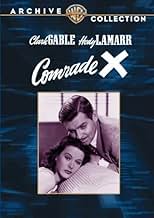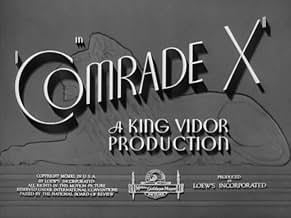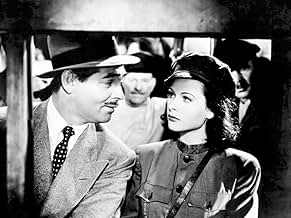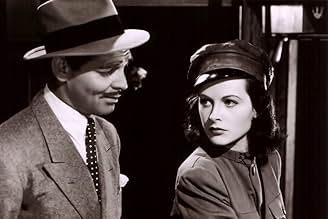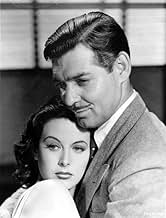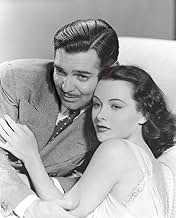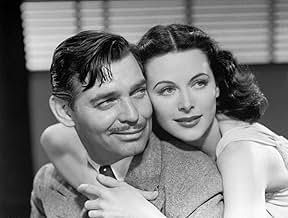An American reporter smuggling news out of Soviet Moscow is blackmailed into helping a beautiful Communist leave the country.An American reporter smuggling news out of Soviet Moscow is blackmailed into helping a beautiful Communist leave the country.An American reporter smuggling news out of Soviet Moscow is blackmailed into helping a beautiful Communist leave the country.
- Nominated for 1 Oscar
- 1 nomination total
Sig Ruman
- Emil Von Hofer
- (as Sig Rumann)
Georges Renavent
- Laszlo
- (as George Renevant)
Ed Agresti
- Press Correspondent
- (uncredited)
Alexander Asro
- Russian Waiter
- (uncredited)
William Bailey
- Press Correspondent
- (uncredited)
Al Bain
- Marriage Bureau Customer
- (uncredited)
Lici Balla
- Russian Woman
- (uncredited)
Leon Belasco
- Comrade Baronoff - Hotel Manager
- (uncredited)
John Bleifer
- Russian Marriage License Clerk
- (uncredited)
- …
Featured reviews
The film fascinates because it was made in 1940, just when WWII was getting started. Nazi Germany and Soviet Russia had just divided Poland between them and neither Nazis nor Communists much admired by most Americans. Our hero, played by Clark Gable, is forced by the Soviets to share his hotel room with a Nazi journalist. The Nazi is a caricature, as are the Soviets, who are shown ordering assassinations a¿of anyone they dislike. At one point the Gable character creates a diversion by shouting out that Germany has just invaded Russia. He is, of course, shouting a year too soon, but the reaction is interesting. The plot itself is foolish, but the glimpse into the past, with references to the Brooklyn Dodgers murdering the Reds (of Cincinatti) makes the movie great fun.
In the days when actresses had genuine accents that put a lilt in their speech, Hedy Lamarr, like Greta Garbo and Ingrid Bergman, had refinement and intelligence, and could portray "foreigners" from any number of countries. Here, Hedy is supposed to be Russian, and with a light touch, too. She makes a charming foil to beefy Clark Gable, who plays his usual role as the macho-male with a wink in his eye covering a heart of gold. Their chemistry is not quite as magical as that in "It Happened One Night," with Claudette Colbert (who had the softer edge and mysterious sex appeal that truly complemented Gable's), or even his pairings with the brassy blonde with the Brooklyn accent, but there are a number of scenes in this farce that I have not seen equalled elsewhere: namely the escape scene in the Soviet tank. Before the age of graphic simulation, the prop men really had to come up with a phalanx of Soviet-style tanks -- unless they used miniatures, and to see them "chase" Gable, with Hedy at the wheel, is almost on a par with a Chaplin or Keaton routine. The miming of the Soviet tank army is also hilarious.
Clark Gable was mostly known for his he-man; lady-killer roles but he did some excellent comedy and this movie is a little-known gem. There were some great lines, too. "Well, there's some good news and some bad news. Last week all the towels were stolen. But on the other hand the water wasn't running so nobody needed the towels. Everything balances." And "Communists have ideas, but they found out you can't run a government with everybody running around having ideas". That's actually pretty true, too! People in government with "ideas" are the bane of ANY country. Loved the scene at the cemetery where the funeral procession passes by a podium carrying a coffin on its shoulders and suddenly the "corpse" sticks his head & hand out of the coffin and takes a shot at a political enemy. Curiously, the movie predicts Germany declaring war on Russia. Which in fact happened shortly after the film came out.
Funny movie - the "Kaputski Cemetery"? Excellent!!!!
Funny movie - the "Kaputski Cemetery"? Excellent!!!!
I thought the chemistry between Hedy and Clark were great. She really came off as a very good commedienne. I thought the lines were real clever and that ending...wow...all those tanks. I enjoyed this movie more than the Ninotchka.
I came in on "Comrade X" during the climatic tank chase scene. I don't know about the film as a whole, but the tank scene was wonderfully done. If it were done today it wouldn't be all that impressive. You'd be like "Hmmm, nice computer work!" But in 1940 it had to be done with actual existing props. So what you have is a swarm of "real" tanks chasing Gable's tank. On command they all stop, spin about and race in the opposite direction. Excellent cartoon like direction and fantastic execution of that direction. If you're a fan of cartoon like sequences done as live action then this film, or at least the final sequences thereof, are for you. Someone just tell me how they did this back in '40! One of the finest examples I can think of a great bit of work stuck somewhere in an almost forgotten film.
I did go back and research the special effects for this film. They were done by none other than A. Arnold Gillespie who won four Academy Awards out of thirteen nominations. Besides "Comrade X", he worked on such little films like "The Wizard of Oz" and "Ben-Hur". As for "Comrade X" a true case of an industry giant being handed what had to be a small assignment considering his considerable talents. The studio system works!
I did go back and research the special effects for this film. They were done by none other than A. Arnold Gillespie who won four Academy Awards out of thirteen nominations. Besides "Comrade X", he worked on such little films like "The Wizard of Oz" and "Ben-Hur". As for "Comrade X" a true case of an industry giant being handed what had to be a small assignment considering his considerable talents. The studio system works!
Did you know
- TriviaAt the time this film was released in 1940, World War II had already begun in Europe, but the Soviet Union still had a non-aggression pact with Nazi Germany. In the film, Mac is able to fool a character by pretending to hear news that Germany has broken the pact and launched an invasion of the USSR. That's exactly what happened the very next year when Germany launched Operation Barbarossa in summer 1941.
- GoofsThe script makes reference to the Soviet law that a person could divorce his or her spouse simply by sending them a postcard announcing that the marriage was over. But in 1936, four years before this film was made, Stalin had repealed that law when he rewrote the Russian constitution and made divorces considerably harder to get.
- Crazy credits"RUSSIA. The never never land of steppes, samovars and spies -- beards, bears, bombs and borscht - where almost anything can happen - and usually does. "
- ConnectionsFeatured in The Miracle of Sound (1940)
- SoundtracksFuniculi, Funicula
(1880) (uncredited)
Lyrics by Peppino Turco
Music by Luigi Denza
Sung a cappella with modified lyrics by Clark Gable
- How long is Comrade X?Powered by Alexa
Details
- Release date
- Country of origin
- Language
- Also known as
- Comrade X
- Filming locations
- Production company
- See more company credits at IMDbPro
- Runtime
- 1h 44m(104 min)
- Color
- Aspect ratio
- 1.37 : 1
Contribute to this page
Suggest an edit or add missing content


